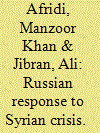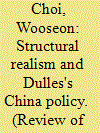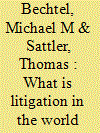| Srl | Item |
| 1 |
ID:
162933


|
|
|
| 2 |
ID:
117837


|
|
|
|
|
| Publication |
2012.
|
| Summary/Abstract |
The Eisenhower administration's tough containment policy toward China has been conventionally viewed as an unsensible policy resulting from domestic political pressures or ideology. Refuting the conventional explanations, this article argues that during the early Cold War, the US superiority in bipolarity drove China to balance the United States in Asia. Dulles, the architect of the China policy, made accurate assessments of the power structure in Asia and the inevitable enmity with China. Driven by structural imperative, he decided to pursue containment to maintain the favourable balance of power in Asia by retarding the relative power growth of China allied with the Soviet Union and secondarily by accelerating their conflict through harder pressure on a weaker China. This case long considered as a prime anomaly to balance of power theory actually demonstrates how powerfully distributions of power shape alliance behaviours of states in the anarchic international system.
|
|
|
|
|
|
|
|
|
|
|
|
|
|
|
|
| 3 |
ID:
139800


|
|
|
|
|
| Summary/Abstract |
Conventional wisdom holds that the creation of international, court-like institutions helps countries to peacefully settle trade conflicts, thereby enhancing overall welfare. Many have argued, however, that these institutions remain ultimately ineffective because they merely reflect the distribution of power in the anarchic international system. We argue that international litigation provides economic spillovers that create opportunities for judicial free-riding and explore empirically how litigation in the World Trade Organization affects bilateral trade between countries involved in a trade dispute. We use a matching approach to compare the dynamics of trade flows between countries that experienced a panel ruling with trade relations of observably similar country pairs that did not experience a ruling. Based on this comparison we find that sectoral exports from complainant countries to the defendant increase by about $7.7 billion in the three years after a panel ruling. However, countries that have proactively filed a complaint and carried the main costs of litigation do not systematically gain more than less-active third parties that merely joined an existing trade dispute. This suggests that international judicial institutions can provide positive economic externalities and may thereby lead to a less power-based distribution of the gains from trade.
|
|
|
|
|
|
|
|
|
|
|
|
|
|
|
|